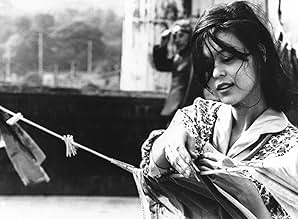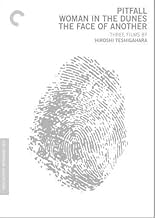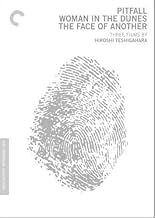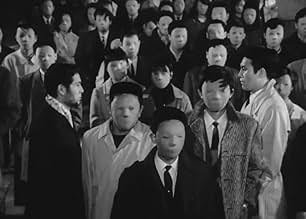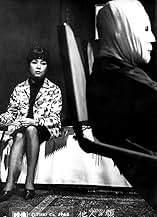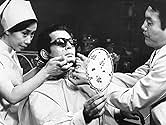Herr Okuyama, ein Geschäftsmann, erhält eine lebensechte Maske, um sein verstümmeltes Gesicht zu verstecken. Erst scheint alles normal, doch bald beginnt die Maske seine Persöhnlichkeit zu v... Alles lesenHerr Okuyama, ein Geschäftsmann, erhält eine lebensechte Maske, um sein verstümmeltes Gesicht zu verstecken. Erst scheint alles normal, doch bald beginnt die Maske seine Persöhnlichkeit zu verändern.Herr Okuyama, ein Geschäftsmann, erhält eine lebensechte Maske, um sein verstümmeltes Gesicht zu verstecken. Erst scheint alles normal, doch bald beginnt die Maske seine Persöhnlichkeit zu verändern.
- Auszeichnungen
- 2 wins total
- Foreign man in Bar
- (Nicht genannt)
Empfohlene Bewertungen
A fascinating piece of film making that has many layers and interpretations. For me, I see Mr. Okuyama representing post war Japan, the accident that removes his features the raw wound of two atomic bombs, the bandages a place to hide while the country considers its future and the new face, the new Japan, that finds a way to integrate itself into a modern world, while holding on to traditions and cultures that take a little more time to retune as the situation clarifies. Any film with Machiko Kyô performing is always a bonus too.
Based on Kobo Abe's novel of the same name, Hiroshi Teshigahara's 'The Face of Another' is a dark, intriguing drama examining notions of identity, appearance and personality, and how the three intersect. Abe's screenplay tackles these themes- as well as that of cultural identity- maturely and with great tact, while also retaining much narrative tension. In fact, if one wished to disregard the psychological and sociological aspects of the story entirely- interpreting the film simply as a horror with a lot of wordy dialogue- one could; and the impact of 'The Face of Another' wouldn't be much diminished.
It is a rewarding experience, however, postulating on the psychological questions raised by Abe's narrative, specifically whether or not one's personality is influenced by one's looks, and the extent to which one's looks informs one's quality of life. It is commonly accepted that physical appearance does have a meaningful impact on people's life experiences and opportunities. Researchers like Daniel Hamermesh posit that the traditionally handsome and beautiful generally have an easier time of things than their less attractive counterparts. At the same time, according to the theory of facultative personality calibration, personalities develop in a way that match other genetic traits, so that one who is more handsome will be more assertive or confident, and vice versa.
'The Face of Another' provokes contemplation around- and plays into- these ideas, as well as examining how Japanese cultural identity was irrevocably altered following WWII and the devastation of Nagasaki and Hiroshima. Okuyama's loss of face and adoption of the mask suggests that one's face is not just a physical feature, but a means of communication with society and oneself. By losing this means of communication, Okuyama loses his connection to his original culture and sense of self. So too did the destruction of Nagasaki and Hiroshima alter the face of Japanese society, ensuring that post-war Japan was- in some ways- indistinguishable from pre-war Japan. In this regard, the film suggests that identity- both personal and cultural- is fluid, and heavily influenced by external factors.
The film inspires rumination around these notions, whilst stunning with its visuals. Hiroshi Segawa's cinematography and shot construction is striking and strange, heightening the eerie tone of proceedings. His work, heavy in visual metaphor, lends sequences- such as a breath-taking, multi-masked crowd scene- an odd but undeniable power. Utilizing a wide variety of stylizations- including bizarre zooms, x-rays and jump cuts- he keeps things feeling consistently fresh, innovative and off kilter. This is only compounded by Arata Isozaki and Masao Yamazaki's surrealist art direction, as well as Yoshi Sugihara's assured, experimental editing, which holds everything together masterfully.
One would be remiss not to discuss the score from Toru Takemitsu, which fluctuates between the macabre and the mournful, while always remaining melodic. The main theme- entitled The Waltz- is particularly atmospheric and haunting, reflecting through it's bittersweet melody Okuyama's fragile psychological state. Furthermore, Taichiro Akiyama's sterling efforts crafting all the masks must be mentioned, as there are a great many throughout the picture and each one is spectacularly insidious.
'The Face of Another' boasts a fine cast of actors all doing superlative work. Tatsuya Nakadai stars as Okuyama, bringing both sides of the fellow to life most efficaciously. Suppressing his characteristic charisma, he lays bare the crisis of personality Okuyama faces, creating a most memorable character in the process. Alongside him, Miki Irie showcases a great emotional perspicuity in her role as the disfigured nurse, stealing all the scenes she's in. Additionally, Mikijiro Hira consistently impresses as the psychiatrist and Machiko Kyo delivers a remarkably understated performance as Okuyama's wife- it's a pity she didn't have more screen time to further develop the character.
A sad film in some regards, a tense one in others; Hiroshi Teshigahara's adaptation of Kobo Abe's novel 'The Face of Another' has a lot to offer viewers. Featuring beautiful black and white cinematography from Hiroshi Segawa and a stirring score from Toru Takemitsu- as well as spellbinding art direction and tight editing- there is very little fault one can find with the picture. Powerfully acted and deftly directed throughout, 'The Face of Another' is a macabre, melancholic masterpiece.
The ubiquitous influence of the French absurdists/existentialists, Kafka and Dostoevsky looms large here- one is reminded most often of Sartre's "No Exit", R.D. Laing's "Knots" and Dostoevsky's "Crime And Punishment". Sartre, Laing and Abe all underline how little autonomy we really have over constituting our own identities- often, we may find that we exist only as beings-for-others, entirely 'encrusted' within personas not of our own making, but assigned to us. For Okuyama and the unnamed scarred woman, they are imprisoned in their vulgar corporeality. Met with revulsion everywhere, they come to accept ugliness as an indelible mark of their being. Trapped within the oppressive confines of flesh, they cannot evade the pity and repugnance that their countenances arouse. It is little wonder that Okuyama becomes self-lacerating and embittered.
Throughout the film, the viewer confronts how precarious identity truly is- the assumption that selves are continuous and linear from day-to-day rests entirely on the visage. The doctor's paroxysm of inspiration in the beer hall affords a glimpse into the anarchic potential of his terrible invention, one that would rend civilization asunder. Indeed, the final epiphany is particularly unnerving- "some masks come off, some don't". We all erect facades, smokescreens of self that we maintain with great effort.
Beneath the epidermis, as Okuyama discovers, is vacuity and nihility. This is likely the explanation for Okuyama's gratuitous, Raskolnikov-esquire acts of crime at the conclusion of the film- faced with the frontierless void of freedom, he desires to be apprehended and branded by society. Integration into society, after all, requires a socially-assigned, unified role, constituted by drivers licenses, serial numbers and criminal records. Without such things, Okuyama is a non-entity.
Aesthetically, the film exhibits all the rigour and poetry of Teshigahara's other work. Cocteau, Ernst and Duchamp, in particular, are notable wellsprings for the film's visual grammar. Literate, expressionistic and profoundly disorienting, this might be my favorite Teshigahara work.
Wusstest du schon
- WissenswertesDirector Hiroshi Teshigahara said that he intended the film to explore both personal and cultural identities. While the examination of personal identity is quite overt, Teshigahara also explored how Japan's cultural identity had been impacted by World War II and its aftermath.
- Zitate
Psychiatrist: You're not the only lonely man. Being free always involves being lonely. Just there is a mask you can peel off and another you can not.
- VerbindungenReferenced in Funeral Parade of Roses (1969)
Top-Auswahl
- How long is The Face of Another?Powered by Alexa
Details
Box Office
- Weltweiter Bruttoertrag
- 35.185 $
- Laufzeit
- 2 Std. 2 Min.(122 min)
- Farbe
- Sound-Mix
- Seitenverhältnis
- 1.33 : 1



